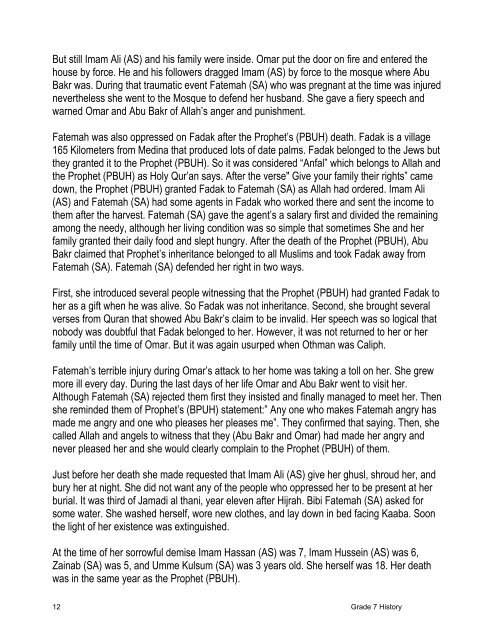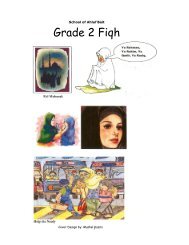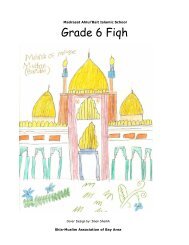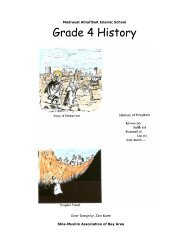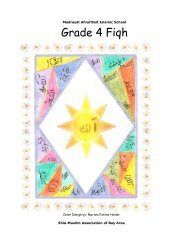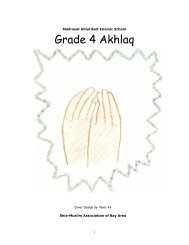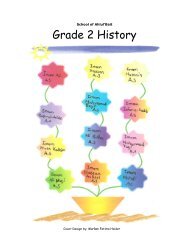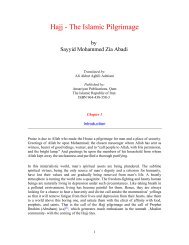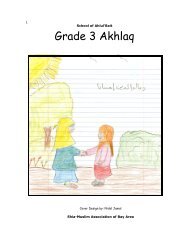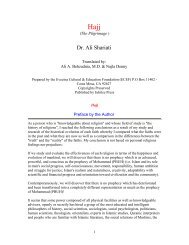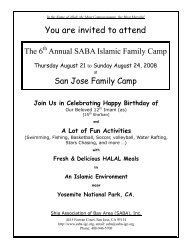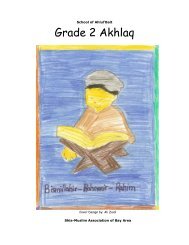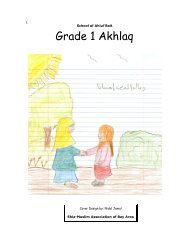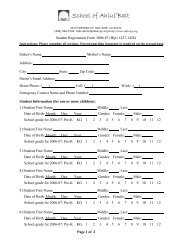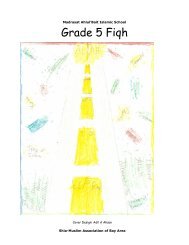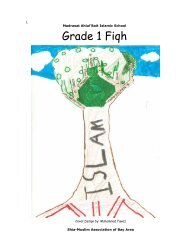Grade 7 History Book (PDF) - Shia Multimedia
Grade 7 History Book (PDF) - Shia Multimedia
Grade 7 History Book (PDF) - Shia Multimedia
You also want an ePaper? Increase the reach of your titles
YUMPU automatically turns print PDFs into web optimized ePapers that Google loves.
But still Imam Ali (AS) and his family were inside. Omar put the door on fire and entered the<br />
house by force. He and his followers dragged Imam (AS) by force to the mosque where Abu<br />
Bakr was. During that traumatic event Fatemah (SA) who was pregnant at the time was injured<br />
nevertheless she went to the Mosque to defend her husband. She gave a fiery speech and<br />
warned Omar and Abu Bakr of Allah’s anger and punishment.<br />
Fatemah was also oppressed on Fadak after the Prophet’s (PBUH) death. Fadak is a village<br />
165 Kilometers from Medina that produced lots of date palms. Fadak belonged to the Jews but<br />
they granted it to the Prophet (PBUH). So it was considered “Anfal” which belongs to Allah and<br />
the Prophet (PBUH) as Holy Qur’an says. After the verse" Give your family their rights” came<br />
down, the Prophet (PBUH) granted Fadak to Fatemah (SA) as Allah had ordered. Imam Ali<br />
(AS) and Fatemah (SA) had some agents in Fadak who worked there and sent the income to<br />
them after the harvest. Fatemah (SA) gave the agent’s a salary first and divided the remaining<br />
among the needy, although her living condition was so simple that sometimes She and her<br />
family granted their daily food and slept hungry. After the death of the Prophet (PBUH), Abu<br />
Bakr claimed that Prophet’s inheritance belonged to all Muslims and took Fadak away from<br />
Fatemah (SA). Fatemah (SA) defended her right in two ways.<br />
First, she introduced several people witnessing that the Prophet (PBUH) had granted Fadak to<br />
her as a gift when he was alive. So Fadak was not inheritance. Second, she brought several<br />
verses from Quran that showed Abu Bakr’s claim to be invalid. Her speech was so logical that<br />
nobody was doubtful that Fadak belonged to her. However, it was not returned to her or her<br />
family until the time of Omar. But it was again usurped when Othman was Caliph.<br />
Fatemah’s terrible injury during Omar’s attack to her home was taking a toll on her. She grew<br />
more ill every day. During the last days of her life Omar and Abu Bakr went to visit her.<br />
Although Fatemah (SA) rejected them first they insisted and finally managed to meet her. Then<br />
she reminded them of Prophet’s (BPUH) statement:” Any one who makes Fatemah angry has<br />
made me angry and one who pleases her pleases me”. They confirmed that saying. Then, she<br />
called Allah and angels to witness that they (Abu Bakr and Omar) had made her angry and<br />
never pleased her and she would clearly complain to the Prophet (PBUH) of them.<br />
Just before her death she made requested that Imam Ali (AS) give her ghusl, shroud her, and<br />
bury her at night. She did not want any of the people who oppressed her to be present at her<br />
burial. It was third of Jamadi al thani, year eleven after Hijrah. Bibi Fatemah (SA) asked for<br />
some water. She washed herself, wore new clothes, and lay down in bed facing Kaaba. Soon<br />
the light of her existence was extinguished.<br />
At the time of her sorrowful demise Imam Hassan (AS) was 7, Imam Hussein (AS) was 6,<br />
Zainab (SA) was 5, and Umme Kulsum (SA) was 3 years old. She herself was 18. Her death<br />
was in the same year as the Prophet (PBUH).<br />
12 <strong>Grade</strong> 7 <strong>History</strong>


